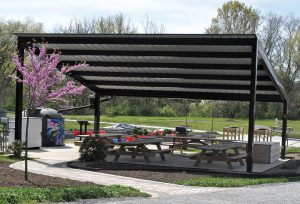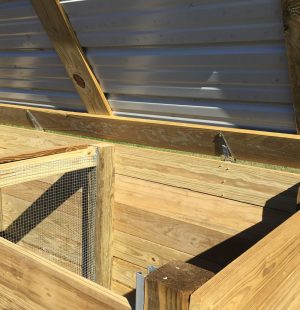Farragut, Tennessee’s Outdoor Classroom, located along the town’s greenway, closes the organics recycling to “food for people” loop.
Alle Crampton
BioCycle October 2016

Elements of the Outdoor Classroom site include: Cistern to harvest rain (left); Rain garden with native plants that captures storm water from the parking area and walkways (center) ; Edible garden (right). Photos courtesy of Tennessee DEC Office of Sustainable Practices
The classroom is within walking distance of Farragut High School and connects to the town’s popular sidewalks and greenways, where the classroom serves as a community focal point, hosting civic engagements and a multitude of educational events. Planning for the classroom began in 2010 with funding provided by a $2,000 Tennessee Recreation and Parks Association grant, and a $19,345 grant from the Tennessee Department of Environment and Conservation’s Green Development Project. The classroom opened in the fall of 2014.
The Outdoor Classroom is a prime example of green development and storm water runoff best management practices. There are multiple types of pervious surfaces across its trails, paved walkways and parking area, enabling percolation or infiltration of storm water through the surface into the soil. The parking area was constructed using permeable pavers that allow water to flow through, then move down a slight hill into a rain garden, a rainwater-fed native planted area.

The Outdoor Classroom provides a hands-on learning environment for residents of Farragut — and showcases green infrastructure, composting and growing produce to donate to
local pantries. Photo courtesy of Tennessee DEC Office of Sustainable Practices
The covered classroom area is a uniquely shaped, slanted-roof pavilion. Water runs down the roof and into a 1,500-gallon cistern used to harvest rainwater. Collected rainwater is used to water the edible garden, which was funded by the Tennessee Recreation and Parks Association grant. This grant covered materials for the raised beds, soil, seeds and plants. The classroom’s built elements, including raised beds, compost storage box, and the picnic tables, were all completed by Eagle Scouts.
Edible Garden, Composting
Town residents and local businesses worked together to get the classroom’s edible garden growing. Soil for the raised beds was blended with aged horse manure supplied by Shangri-La Therapeutic Academy of Riding (STAR), a local nonprofit riding facility in Lenoir City. In return for a donation to STAR by the Farragut storm water division, the academy provides truckloads of horse manure to the Outdoor Classroom.

Three-sectional composting bin onsite at the classroom was built by an Eagle Scout candidate. Photo courtesy of Tennessee DEC Office of Sustainable Practices
A 3-section composting bin on site at the Outdoor Classroom was designed and built in October 2015 by Dam Primka, an Eagle Scout candidate at the time. Some composting has been started, but there has been a learning curve. “Andrea is learning and, in turn, educating several Girl Scouts as well,” says Lori Saal, the Farragut storm water coordinator. “These girls are between 8 and 14 years old, so it’s a great time for them to be learning about composting and its benefits.” The first composting recipe included a combination of horse manure, weeds, grass clippings, dead or diseased plants, sticks, and inedible vegetables. “This was my attempt at casual cold composting,” recalls Valdyke, who has since attended compost training sessions at Pellissippi State Community College, and visited other community gardens to learn more about composting methods.
One of her biggest obstacles is an adequate supply of “browns and greens” for amendments, she adds. “I’m developing a relationship with Farragut’s Public Works Department, and set up a source for materials like dried leaves, woods chips, and grass clippings.” Her composting recipe now includes a mix of dry leaves, shredded newspaper, horse manure and stall bedding, fruit scraps, vegetable scraps, egg shells, and grass and plant clippings. Current plans for the Outdoor Classroom’s composting project include getting a large, productive composting process underway within the next year. Finished compost will be used as a soil additive for the raised beds, as well as all planted areas around the facility. The compost is expected to aid in the decrease of any rainwater runoff, add moisture retention qualities to the soil, and provide beneficial nutrients. “Everything at the Outdoor Classroom is meant to provide unique educational opportunities to those in our community and composting is no different,” explains Saal.
Donating Produce
The edible garden grows produce year-round. Between August 2015 and June 2016 the garden donated nearly 40 pounds of produce to Faith Lutheran Church’s Sheperd of Good Hope Food Pantry. In late spring, a partnership was cultivated between the Outdoor Classroom and the Concord United Methodist Church (CUMC) in Farragut. Together, over 900 pounds of fresh produce were donated to the Sheperd of Good Hope Food Pantry, the Good Samaritan Food Pantry, and a local senior citizens day care facility. These partnerships and resulting donations are important because in Tennessee, one out of every five residents is food insecure, meaning at some point, they have experienced difficulty in acquiring sufficient food due to a lack of money or ability to get to the grocery store.
Concern about plants freezing during the winter led Valdyke and her young team to do some creative problem solving. They purchased large pickle buckets from a restaurant for $2.00 each and placed them over the individual plants. Some buckets were also used to collect rainwater when the cistern was winterized and unusable. “The kids are starting to look at how to reuse things,” observes Saal. “They are being creative and thinking outside the box.”
Alle Crampton is an Environmental Specialist with the Tennessee Department of Environment and Conservation Office of Sustainable Practices. She works on food waste prevention across the state, and serves as the administrator for the Tennessee Green Star Partnership.










